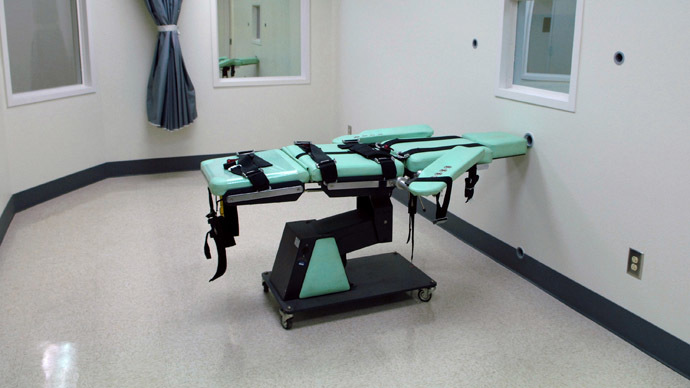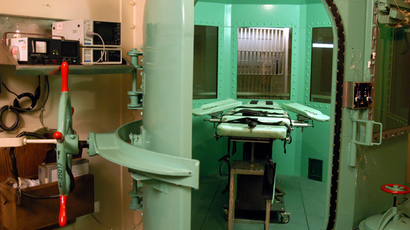After acquiring necessary drug, Tennessee wants to execute 11 inmates

A recent maneuver out of the state attorney general’s office in Tennessee is being called unprecedented after officials there asked the Supreme Court for permission to execute 10 prisoners currently on death row.
Those ten inmates have been awaiting execution an average of more than 27 years, but the state put a hold on the practice of putting prisoners to death in 2011 after it was forced to surrender its supply of sodium thiopental, a sedative that had up until then been one of three components used in the lethal cocktail administered by executioners in Tennessee.
Just this September, though, the Tennessee Department of Correction announced it would be switching to a single-drug lethal injection method, relying instead on just one narcotic, pentobarbital, which had been used primarily by veterinarians up until recently when other states began administering it to death row inmates.
The use of pentobarbital as the sole drug of choice at executions across the United States has generated a fair share of criticism and safety concerns in recent years, but it isn’t the narcotic that’s now raising questions in Tennessee. Rather, officials are being asked to explain why for the first time presumably ever they’ve ordered at once death warrants for 10 separate individuals.
Tennessee has only executed six prisoners between 1960 and 2009, and hasn’t ended an inmate’s life at all since 2009. According to an article published Thursday morning by The Tennessean’s Brian Haas, however, officials there are now hoping to have 10 inmates all killed in only a few months’ time.
That surge in requests, many suspect, is a result of the September 2013 decision to begin using pentobarbital after a four-year lull in state-sanctioned killings. Now should officials follow through with their intentions, a state that hasn’t sent a death row inmate to be executed in practically half-a-decade will be dabbling in a rapid series of killings, unprecedented there or likely elsewhere.
“I’ve been representing death row inmates for two decades, and never in my experience have I ever seen a situation where a state has requested 10 execution dates all at once,” Kelley Henry of the Federal Public Defender’s Office in Nashville told the Tennessean. “This is an unprecedented situation.”
The ten inmates have each been long-convicted of violent crimes, including acts of rape and murder that have earned them their spot on death row, and an eleventh man’s death has been separately ordered by the state to occur this upcoming April as punishment for killing a police officer almost a decade ago.
According to Haas, outcry from the families of the prisoner’s victims could very well be playing a role as well. David Raybin, a defense attorney from Nashville who Haas claims to have “essentiallywrote the state’s death penalty statute,” said complications are arising from a literal backlog of prisoners slated to be killed.
“For lack of a better word, (executions) sort of backed up,” Raybin said. “I think what they’ve done is, they’ve said, ‘We’ve backed up for so long and now we want to put them all on a fast track because nothing has happened for years.’ ”
“I think what happened is, is the pipe has been cleared,” Michael Rushford, the executive director of the pro-death penalty Criminal Justice Legal Foundation, added to the Tennessean report. “This is just built-up cases that they now are able to get into this position.”
And the family members of victims, Haas added, are eager to see these inmates be executed as well. The Tennessean cites the example of Paul Dennis Reid, Jr., a convicted mass murderer who spent more than 15 years on death row until this past November when he died, naturally, at a Nashville hospital.
“You’ve got a guy who killed all those people, the most infamous guy on death row, and he dies a natural death,” Raybin said. “Some people could say, ‘We’re offended because he wasn’t executed.’ ”
As for what the state has to say, though, it’s merely a maneuver that has been made because carrying out executions is only just now becoming logistically possible once again.
“We filed all 10 motions at the same time because they were all ready to be set for execution, and TDOC was in a position to carry them out under a new protocol,” Tennessee Attorney General’s Office spokesperson Sharon Curtis-Flair told the Tennessean. “The Department could not have carried out the executions earlier because it was unable to procure all of the drugs required under the old protocol.”
Now with their latest legal effort, Tennessee could very well be cleared to start making room within its death row cells. The Supreme Court has been asked by the state’s attorney’s general office to schedule dates for the 11 executions, after which 67 inmates will remain locked-up anticipating a death by lethal injection that’s now more-likely-than-ever to occur.
In the meantime, though, legal hurdles could quite easily complicate those killings. As was the case in Missouri only a few weeks ago, a Neo-Nazi serial killer was executed with an injection of pentobarbital, but only after the Supreme Court said they wouldn’t weigh in on the issue. Two US District Court judges had placed a hold on the killing of the man, 63-year-old Joseph Paul Franklin, citing concerns about using the veterinary drug without proper research. The state quickly appealed those stays, and Franklin was ultimately executed on Nov. 20 for his role in a spree that claimed no fewer than eight victims.
When Tennessee announced in September that it would be using solely pentobarbital for executions, it became the eighth state in the nation to do so.














